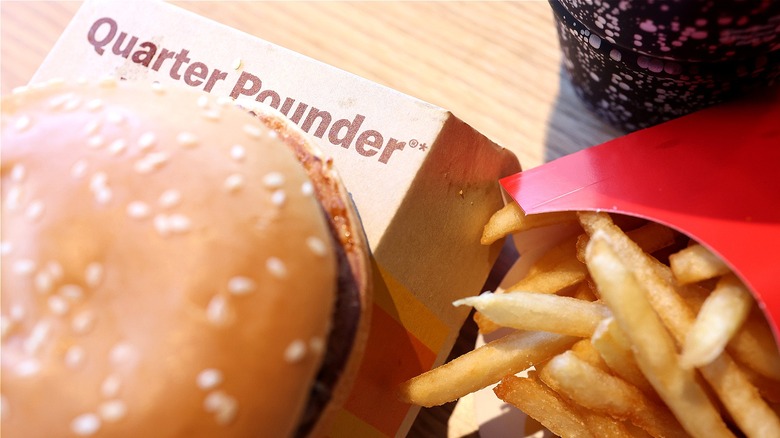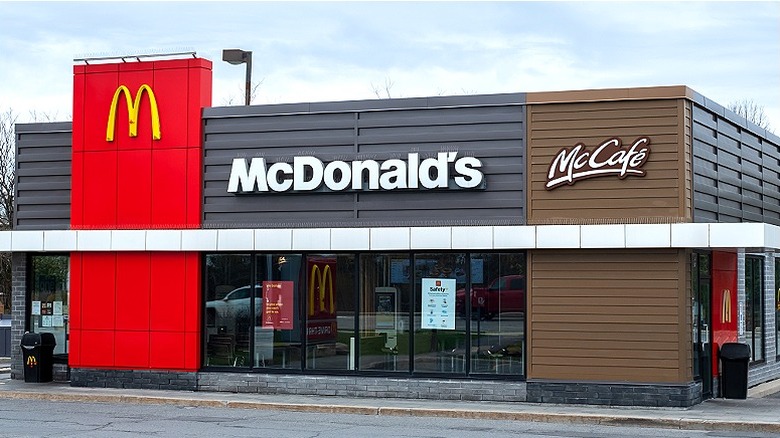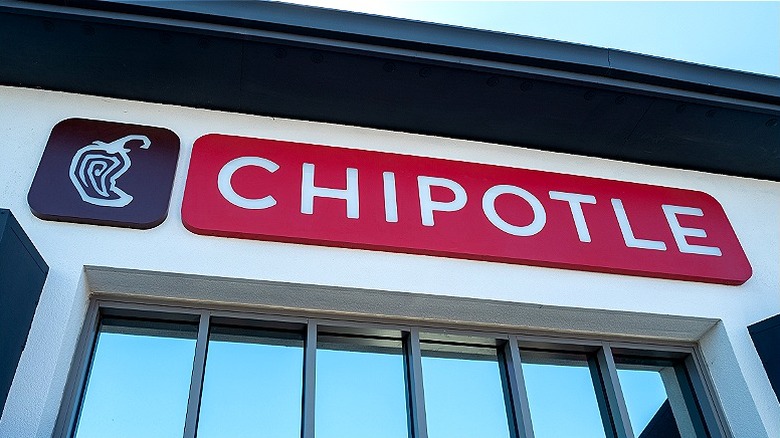How The McDonald's Listeria Recall Could Affect Its Bottom Line
It feels like everywhere you look there's a new food recall. From Boar's Head's nationwide listeria outbreak (which affected over 70 products and killed 10 people) to TreeHouse Foods' frozen waffles and pancakes (sold under brand names like GoodValue, Kodiak Cakes, Best Choice, and more), 2024 has been filled with bacteria-related food contaminations and recalls. With a wide range of products, including things like eggs and green onions (both for salmonella), it can be hard to know what food is safe. While grocery contaminations might have you considering eating out instead, you could find yourself disappointed by that option as well considering the latest hazard in this long stretch of food recalls: the McDonald's Quarter Pounder.
According to a report from the U.S. Centers for Disease Control and Prevention, it's still not known what the exact ingredient is that is causing McDonald's E. coli contamination. However, the company has discontinued using the fresh onions that typically go on Quarter Pounder hamburgers while the investigation is ongoing.
As of October 25, the outbreak has 75 confirmed cases, resulting in 22 hospitalizations and one death. Even more concerning is that the outbreak has so far affected consumers across 13 different states. While contaminations and food recalls are harmful to consumers, oftentimes the long-term ramifications of these outbreaks (on the companies responsible for them) can be significant. This particular outbreak could prove especially difficult for a company like McDonald's that has been struggling to maintain market share amidst rising costs.
Financial implications for a company
A food recall can lead to a significant loss of income for a company. Not only can recalls lead to direct costs from the necessary tracking, retrieving, and disposing of recalled products or ingredients (not to mention the loss of productivity from halting production and alerting agencies), but the indirect costs can be even worse.
For starters, the loss of sales that can immediately follow a recall can be difficult to measure but ultimately have lasting financial implications. Plus, legally speaking, a company could face lawsuits from consumers for damages, illness, or death caused as a result of its contaminated food product. These legal fees and settlement agreements can quickly add to the total expense of a food recall.
Perhaps the most significant damage that can occur as a result of a food recall is tied to the broken trust a brand must now repair with its consumers. Not only can this brand damage lead consumers to avoid certain items, but some consumers might lose faith in a company altogether. A loss of brand trust can be one of the most expensive consequences of a food recall.
According to a 2012 report from the Food and Drug Administration, the average cost of a small or medium food recall at that time was around $10 million. However, it's worth noting that this average amount has absolutely gone up in the 12 years since it was published, and that the $10 million total only factored in the direct costs of retrieving and disposing of contaminated products.
Can companies recover?
McDonald's is by no means the first major chain to be affected by contaminated ingredients and subsequent food recalls. Chipotle Mexican Grill, for instance, faced multiple highly publicized outbreaks beginning in 2016, which affected the company's future. In fact, Chipotle lost $600 million in sales in 2016 and ended up paying a $25 million fine to resolve criminal charges stemming from the 1,100 affected consumers the company purportedly sickened from 2015 to 2018. Despite all of this, Chipotle is still a household name, and has even experienced a 39% increase in its stock prices in 2024.
The main factors that could affect the long-term effects of this latest food recall for McDonald's center on how long it takes to identify the culprit ingredient, and what that ingredient turns out to be. For instance, if this particular contamination does turn out to be tied to the specific diced onions used in Quarter Pounders, then it's more likely that customers will see this particular recall as isolated.
Plus, the onions being the culprit, as opposed to meat or other ingredients used across numerous McDonald's menu items, would ensure that the total number of affected consumers remains smaller. That being said, building back consumer trust can (and will) still be a tricky formula, especially as McDonald's continues to extend its special offers like the $5 meal deal (here's how much McDonald's actually makes from this promotion) in an effort to prove value and win back consumers who have been scared off by increasing prices. (Find out how much Americans spend on fast food today.)


